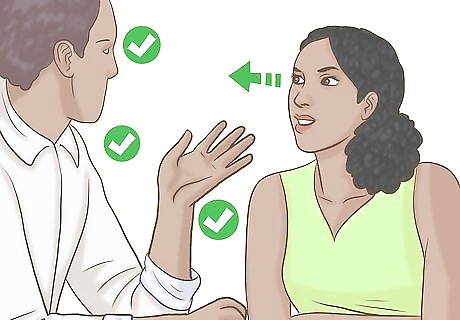
views
Becoming a Better Listener

Reflect on when and why you interrupt others. Take a few moments to think about the situations where you tend to interrupt the most. Is it when you’re talking to particular people, or in certain types of conversations? What are you usually thinking, feeling, or trying to accomplish when you interrupt? Keep these factors in mind before entering a conversation so that you that you can be prepared to keep your urge to interrupt in check. For example, maybe you tend to interrupt when arguing with your significant other because you feel defensive and want to take control of the conversation. In a setting like a work meeting, you may interrupt because you are eager to get your ideas heard right away. Tell yourself something like, “I know I tend to talk over my friends a lot because I get excited and want to keep the fun going by cracking jokes and cutting in with funny stories. Next time, I’m just going to focus on listening and waiting until it’s the right time to speak.”

Make a conscious decision to stay quiet. If you’re in the habit of interrupting others, you may find yourself cutting in or blurting something out before you even realize you’re doing it. Before starting a conversation, tell yourself, “I’m going to be quiet until they’re finished speaking.” You can also remind yourself physically by: Gently biting your tongue until you are ready to speak Resting your finger against your lips as you listen Taking 3 deep breaths whenever you feel the urge to speak

Listen mindfully to what the other person is saying. While the other person is speaking, focus your full attention on what they have to say. If you’re spending the whole conversation planning what you want to say and looking for an opening, you won’t really absorb what they are trying to tell you. Listening is about more than just hearing. Focus on the other person’s words and think about what they are trying to convey. Watch them as they speak so that you pick up on their body language and other non-verbal cues.

Show you are listening with eye contact and body language. You may be tempted to show you are listening by cutting in with “cooperative interruptions,” such as finishing the other person’s sentences or offering affirmations (e.g., “Oh yeah, I totally get what you’re saying!”). Instead, demonstrate that you are engaged by maintaining eye contact and using silent cues like nodding or shaking your head. That way, you won’t disrupt the flow of their speech. It’s okay to use some verbal listening cues, but keep them short. For example, you could say “Mm-hmm,” “Yeah,” or “Right.”

Apologize quickly if you do accidentally interrupt. If you find yourself interrupting despite your best efforts, don’t beat yourself up about it. As soon as you realize you’ve interrupted, say something like, “Oh, I’m sorry. Go on.” Don’t apologize more than once or make a bigger deal out of it than you already have. The person you are talking to will likely recognize and appreciate that you are making the effort to listen better.

Ask others for reminders if you need them. If breaking the interruption habit is a real struggle for you, don’t be afraid to enlist the help of a friend, loved one, or colleague. Say something like, “Hey, I know I interrupt too much, and I’m trying to stop doing that. If you hear me interrupting, could you please say something?” If you’re getting help from someone you talk to one-on-one, like a partner or friend, you could ask them to use a verbal cue. For example, they might say, “Excuse me, I wasn’t finished,” or “Hey, you’re interrupting me again!” For a situation like a work meeting, you might ask one of your coworkers to give you a more discreet signal, like shaking their head or tapping their lips to remind you to be quiet.
Choosing When to Speak

Take notes so you don’t forget what to say. If there’s something you absolutely have to say or ask during a conversation, write it down instead of blurting it out. This will help you keep track of what you wanted to say without interrupting the flow of conversation. Bring a notepad with you to important meetings so that you can jot down questions and comments. If you’re using a smartphone or tablet instead of pen and paper, you might say, “I’m just going to take a few notes here.” That way, the other person won’t think you’re texting or playing on your device while they talk.

Look for verbal and non-verbal cues that it’s your turn. Don’t assume that the other person is done speaking just because they’ve finished a sentence or stopped talking for a moment. They might be pausing for breath or formulating their next thought. Instead, look for cues like them turning to look at you pointedly or saying something like, “What do you think?” If they stop talking and you’re not sure whether they’re done, wait 10 seconds before you speak. If they don’t say anything or if they prompt you to chime in, go ahead and talk.

Ask if you can speak when in doubt. If you’re still not sure whether it’s appropriate for you to chime in yet, politely ask the other person. You could say something like, “Do you mind if I say something?” or “May I ask a question?” You might even say, “Were you finished, or did you want to add something else?” Speak in a friendly, polite tone so that you don’t sound pushy or impatient. If you’re in a group setting, such as a work meeting or a classroom, you could also use a non-verbal signal that you’d like to speak, such as raising your hand.

Take a moment to think about what to say. Don’t rush to speak as soon as the other person is done. Instead, pause for a second to think about what they said and come up with a response. This will also give the other person a chance to clarify or add to what they’ve already said if necessary. Think about whether what you want to say is helpful and relevant to the conversation. If you need to, ask the other person for clarification before you respond. One way to do this is to rephrase what the other person said in your own words. For example, “So, you’re saying you aren’t satisfied with the presentation we put together and you want to redo some of the visuals. Is that right?”

Interrupt politely if you absolutely have to. While it’s best not to interrupt at all if you can avoid it, there are times when it’s necessary. If you must interrupt—e.g., if you misheard or misunderstood something, or if you have to cut the conversation short for some reason—start the interruption with an apology or a polite “Excuse me.” For example, if you think you misheard the speaker, say something like, “Excuse me, could you please repeat that last part? I didn’t catch what you said.” If you have to interrupt because you’re running late for another obligation, try saying, “I’m so sorry to interrupt, but I have to run to a meeting. Can we pick this up again next time?”


















Comments
0 comment